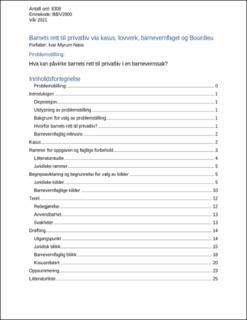| dc.contributor.advisor | Sundby, Roar | |
| dc.contributor.author | Næss, Ivar Myrum | |
| dc.date.accessioned | 2021-09-28T18:48:25Z | |
| dc.date.available | 2021-09-28T18:48:25Z | |
| dc.date.issued | 2021 | |
| dc.identifier | no.ntnu:inspera:79529906:35651647 | |
| dc.identifier.uri | https://hdl.handle.net/11250/2785786 | |
| dc.description.abstract | Problemstilling: Hva kan påvirke barnets rett til privatliv i en barnevernssak?
Besvarelsen undersøker hva som kan påvirke barnets rett til privatliv i en barnevernssak. Den tar utgangspunkt i selverfart kasus, lovverk, kunnskap fra barnevernsbarn, relevante barnevernfaglige kilder og anvender bl.a. Bourdieus begreper om sosial og kulturell kapital. Aktørene i fokus er barnet, foreldrene og barneverntjenesten.
Det legges til grunn at enhver barnevernssak påvirker barnets rett til privatliv i større eller mindre grad. Underveis argumenteres det for at blant annet juridiske avveininger, barnets autonomi og barneverntjenestens skjønnsutøvelse kan påvirke barnets rett til privatliv.
Kasus gir eksempler på konkrete måter kontaktperson i barneverntjenesten kan påvirke på.
Barnets rett til privatliv anses som en form for sosial kapital, og det argumenteres for at barnets kulturelle kapital kan ha en korrelasjon med barnets evne til å påvirke rettigheten. Det gjøres forbehold om mulige svakheter ved Bourdieus teori i denne oppgavens kontekst.
Et formål med oppgaven utover å besvare problemstillingen er å anskaffe mer kunnskap om, samt å oppøve refleksjon rundt rettigheten. Det stilles spørsmål ved om slik kunnskap og refleksjon kan gjøre en bedre i stand til å identifisere barnets rett til privatliv i praksis. | |
| dc.description.abstract | Problem statement: What might influence the childs right to privacy in a child welfare case?
This thesis seeks to understand what might influence the childs right to privacy in relation to a child welfare case. It is based on a selfexperienced case, law, knowledge from children formerly in contact with child welfare services, relevant child welfare sources and employs Bourdieus concepts of social and cultural capital. The actors in focus are the child, parents and the child welfare service.
The thesis operates on the understanding that every child welfare case influences the childs right to privacy to some extent. Furthermore it argues that amongst other things, legal considerations, the childs autonomy and the professional exercise of discretion from the child welfare service might influence the childs right to privacy. The given case serves concrete examples of ways the child welfare worker might influence the right.
The childs right to privacy is viewed as a form of social capital, and it is argued that the childs cultural capital may correlate to the childs ability to influence its right to privacy. Possible weaknesses in Bourdieus theory in context with the thesis are mentioned.
In addition to answering the problem statement, a purpose of this thesis is to gather more knowledge about, as well as to exercise the ability to reflect upon the childs right to privacy. In relation to this the thesis asks if such knowledge and reflection might make one better suited to identify the childs right to privacy in working-situations. | |
| dc.language | nob | |
| dc.publisher | NTNU | |
| dc.title | Barnets rett til privatliv via kasus, lovverk, barnevernfaget og Bourdieu | |
| dc.type | Bachelor thesis | |
